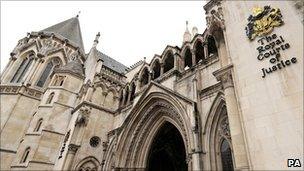Journalist's Twitter posts spark prosecution call
- Published

It is thought Schillings approached a High Court judge about an alleged breach of a privacy order by a journalist
The attorney general is being asked to consider prosecuting a journalist who allegedly broke a privacy order on social networking website Twitter.
The unnamed writer allegedly named a footballer, who is accused of having an affair, known in court papers as TSE.
The law firm reported to be seeking the prosecution, Schillings, has already secured a court order over revelations on Twitter about a different footballer known as CTB.
The attorney general's office said it would "consider the matter carefully".
However, it said the request had not yet been received.
A spokesman for the attorney general's office said: "As with all referrals, the attorney will of course consider the matter carefully, and take action if necessary.
"It's worth pointing out that the attorney does not have a general enforcement role in regard to civil injunctions although he may bring proceedings in circumstances where public interest warrants it.
"Normally the aggrieved party would be expected to bring proceedings to protect their interests."
Year-long inquiry
The footballer TSE and his companion - known as ELP - received an emergency injunction earlier this month stopping News Corporation from reporting their alleged affair.
The Mail on Sunday says the unnamed journalist accused of revealing his name works for a leading UK newspaper and appears on a "widely-viewed BBC programme".
The alleged breach comes amid heightened scrutiny of gagging orders such as injunctions and so-called super-injunctions - court orders that prevent the media from revealing even the fact that an injunction has been granted.
Schillings is also representing CTB, who is taking action against ex-Big Brother star Imogen Thomas and the Sun newspaper.
Recently the firm obtained a High Court order on his behalf, asking Twitter to disclose details of users who had revealed his identity.
'Out of control'
And on Friday, the findings of a year-long inquiry by a committee of judges and lawyers into the use of injunctions and super-injunctions were revealed.
The committee's report, external said super-injunctions were now being granted for "short periods" and only where "secrecy is necessary".
Committee chairman Lord Neuberger, who is the most senior civil judge in England and Wales, said the internet "does add to difficulties of enforcement at the moment".
He said the internet had "by no means the same degree of intrusion into privacy as the story being emblazoned on the front pages of newspapers", which "people trust more".
However, he warned that modern technology was "totally out of control" and society should consider other ways to bring Twitter and other websites under control.